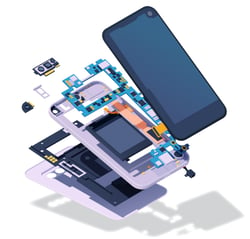 Product managers have traditionally been viewed as intermediaries tasked with understanding customer requirements and translating them into products and features that engineers and product teams understand. However, the rapidly evolving landscape of hardware development has resulted in a significant transformation of the product manager's role, requiring them to step into more prominent positions of leadership and innovation to build successful products.
Product managers have traditionally been viewed as intermediaries tasked with understanding customer requirements and translating them into products and features that engineers and product teams understand. However, the rapidly evolving landscape of hardware development has resulted in a significant transformation of the product manager's role, requiring them to step into more prominent positions of leadership and innovation to build successful products.
4 Factors Affecting the Role of The Product Manager
1. The Need For Customer-Centric Solutions
This evolution in the role of the product manager has come about from the need to provide customer-centric solutions. In the past, most ideas for new features would come from engineering and design teams to be presented to the consumer; today, product managers are responsible for understanding the customer's pain points and providing a solution to their needs. Customers also have higher expectations and seek products that fulfill their immediate requirements and provide a seamless experience.
2. The Complexities of Modern Hardware Products
As software is increasingly integrated into hardware products, product managers must manage dependencies by facilitating effective communication between hardware and software teams. Product managers need to understand the intricacies of both hardware and software to ensure that both teams align toward a unified product vision and the final product is functional, cohesive, and user-friendly.
3. The Adoption of Agile Product Development Practices
The integration of software into hardware products also requires the adoption of more agile practices. Product managers must work iteratively so they can pivot quickly and adapt the product in response to market changes and customer needs.
4. The Rapid Pace of Technological Change
Advancing technology creates opportunities for innovation. Such rapid changes require agility and adaptability to be built into the product development process. The product manager must create a vision for the product that meets current technological needs but with a close eye on the future.
The Role of the Modern Product Manager
 Product managers are not just translators. Product managers must be visionaries and leaders responsible for identifying customer pain points and prioritizing market ideas based on market trends and needs. Product managers are uniquely positioned to fill the gap between customer needs and engineering realities to see that the final product meets customer expectations while being financially and technically feasible. Successful product managers also need to exhibit strong communication skills and collaborate closely with design and other development teams to create the type of products that customers like the look of and find easy to use.
Product managers are not just translators. Product managers must be visionaries and leaders responsible for identifying customer pain points and prioritizing market ideas based on market trends and needs. Product managers are uniquely positioned to fill the gap between customer needs and engineering realities to see that the final product meets customer expectations while being financially and technically feasible. Successful product managers also need to exhibit strong communication skills and collaborate closely with design and other development teams to create the type of products that customers like the look of and find easy to use.
Become Customer-Centric Leaders
Understanding customer requirements relies on the assumption that customers know exactly what they want. Experienced product managers know that this approach is limited as customers don't always know what they need nor how to express their needs. Henry Ford famously said, "If I had asked people what they wanted, they would have said faster horses." This quote highlights the challenge of relying solely on customer input; product managers must exhibit vision and creativity when building products for the future.
Understand the Difference Between Desire vs. Need
Providing a solution to a problem, as opposed to fulfilling a desire, provides a deeper understanding of the psychology of the consumer. This understanding allows product managers to propose innovative solutions to problems customers may not have identified for themselves. Consider the shift from gasoline-powered vehicles to electric vehicles as a move to satisfy the need not just for transportation but sustainable transportation.
Integrate the User Experience in the Product Design
 The user experience is a critical factor when designing hardware products. A product manager must collaborate closely with UX designers so that the product's aesthetics and usability offer an experience that aligns with customer expectations. This requires a product manager to gain deep insights into the pain points, behaviors, preferences, and motivations of the consumer, to drive design decisions that will enhance user satisfaction and loyalty.
The user experience is a critical factor when designing hardware products. A product manager must collaborate closely with UX designers so that the product's aesthetics and usability offer an experience that aligns with customer expectations. This requires a product manager to gain deep insights into the pain points, behaviors, preferences, and motivations of the consumer, to drive design decisions that will enhance user satisfaction and loyalty.
Provide Product Leadership
As product managers transition from requirement translators to taking on a leadership role, they must take the lead on deciding which products to build and which features to prioritize—with approval from company executives and finance teams. As decision-makers, they must strike a balance between meeting customer needs and satisfying company goals, what trade-offs to make, and how to allocate resources effectively. This requires strong analytical and organizational skills to bring a successful product together.
Lifecycle Management and Iterative Development
The role of product managers extends beyond the initial launch of a product. They are responsible for managing the entire product lifecycle, including post-launch activities such as updates, enhancements, and maintenance. Iterative development cycles are becoming common, where products are continuously improved based on customer feedback. Product managers must oversee these ongoing improvements, ensuring the product remains relevant and competitive in the long term.
Engage With Company Stakeholders
Great product managers must have excellent communication skills; they must be able to engage with a range of stakeholders, including company executives, engineers, customer success teams, and sometimes customers themselves. The ability to connect well with each stakeholder is crucial to advance the development of the product and to meet the larger business goals.
Promote Collaboration Among Teams
Due to the complex nature of the manufacturing process, product managers should encourage collaboration between product teams. When teams work collaboratively, you benefit from their collective expertise, enhance problem-solving and promote innovation. Cross-functional collaboration is essential when building hardware products, software products, or integrating software into hardware products.
Product Roadmaps to Guide Development
 Product roadmaps are essential when developing complex hardware and software products as they provide a single source of truth that all stakeholders can adhere to.
Product roadmaps are essential when developing complex hardware and software products as they provide a single source of truth that all stakeholders can adhere to.
Keep Track of Progress
The product manager is responsible for keeping the development process on track and uses product roadmaps to align product teams with the timeline. A high-level dashboard is useful for monitoring the progress made on all products in a product line, while a more detailed view offers an in-depth look into each product and its milestones.
Keep Product Teams Aligned
The product roadmap offers a single source of truth that all stakeholders can work from. It also maps dependencies for different components so teams can work more efficiently, knowing when and how their portion of the product aligns with the plans of other teams.
Highlight Future Product Goals
Long-term product roadmaps outline the product strategy so team members can keep track of product goals and better prepare for upcoming feature updates. The roadmap also helps product managers stay aware of when a new component is ready to introduce, and older features are ready to be phased out.
Essential Tools For the Modern Product Manager
To be successful in their role, modern product managers need access to powerful tools to guide the development process. Gocious product roadmap management software has been designed specifically with the needs and challenges of the product manager in mind. Book your free demo to learn how Gocious can help you to better navigate the changing product development landscape.


